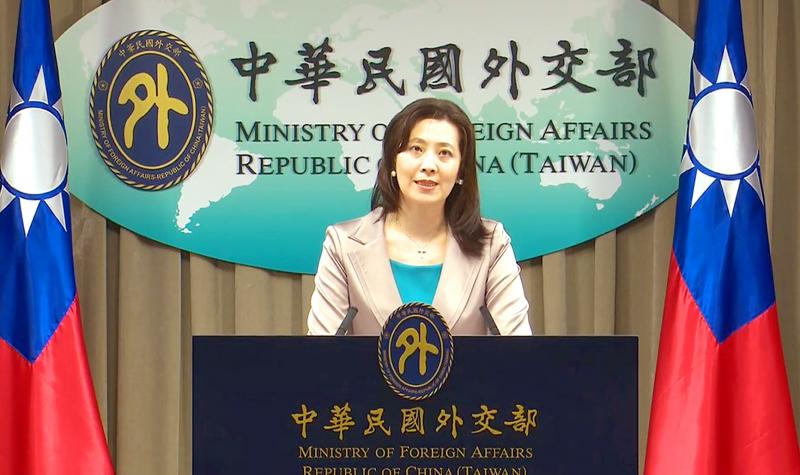Minister of Foreign Affairs Joseph Wu (吳釗燮) is next week to visit Slovakia and the Czech Republic to enhance ties with the central European countries, the Ministry of Foreign Affairs said yesterday.
In Slovakia, Wu would give a keynote speech on Tuesday next week at a conference on “Resilience in a post-pandemic world” hosted by the Bratislava-based think tank GLOBSEC, ministry spokeswoman Joanne Ou (歐江安) said.
Wu would then travel to Prague, where he is to receive a medal from Czech Senate President Milos Vystrcil to honor the minister as a special guest of the country, and meet with Prague Mayor Zdenek Hrib.

Photo: Lu Yi-hsuan, Taipei Times
Wu would also speak at a seminar cohosted by the Czech Academy of Sciences and Prague-based think tank Sinopsis, Ou said.
Although Wu would not attend a conference organized by the Inter-Parliamentary Alliance on China in Rome on Friday next week, “due to a tight schedule and each country’s COVID-19 prevention rules,” he would speak at the conference virtually, Ou said.
Wu’s European trip to two countries with which Taiwan has no official diplomatic relations is rare for a Taiwanese foreign minister, given that the countries usually face strong pressure from Beijing to prevent such trips.
The ministry did not say when Wu is expected to depart or when he would return.
Wu’s visit coincides with one by a trade delegation led by National Development Council Minister Kung Ming-hsin (龔明鑫).
The 66-person delegation departed on Wednesday to visit the Czech Republic, Slovakia and Lithuania, as part of the government’s efforts to boost trade and economic ties with central and east European countries. The visit ends on Saturday next week.
While Wu’s visit would not overlap with the trade delegation’s itinerary, it shares the same goals of expressing the strategic importance of Taiwan, its economic strength and its resolve to defend its democracy, Ou said.
Taiwan plays a critical role in forming a robust democratic supply chain, and in maintaining peace and stability in the Taiwan Strait, she added.
Additional reporting by Lu Yi-hsuan

CHAOS: Iranians took to the streets playing celebratory music after reports of Khamenei’s death on Saturday, while mourners also gathered in Tehran yesterday Iranian Supreme Leader Ayatollah Ali Khamenei was killed in a major attack on Iran launched by Israel and the US, throwing the future of the Islamic republic into doubt and raising the risk of regional instability. Iranian state television and the state-run IRNA news agency announced the 86-year-old’s death early yesterday. US President Donald Trump said it gave Iranians their “greatest chance” to “take back” their country. The announcements came after a joint US and Israeli aerial bombardment that targeted Iranian military and governmental sites. Trump said the “heavy and pinpoint bombing” would continue through the week or as long

TRUST: The KMT said it respected the US’ timing and considerations, and hoped it would continue to honor its commitments to helping Taiwan bolster its defenses and deterrence US President Donald Trump is delaying a multibillion-dollar arms sale to Taiwan to ensure his visit to Beijing is successful, a New York Times report said. The weapons sales package has stalled in the US Department of State, the report said, citing US officials it did not identify. The White House has told agencies not to push forward ahead of Trump’s meeting with Chinese President Xi Jinping (習近平), it said. The two last month held a phone call to discuss trade and geopolitical flashpoints ahead of the summit. Xi raised the Taiwan issue and urged the US to handle arms sales to

BIG SPENDERS: Foreign investors bought the most Taiwan equities since 2005, signaling confidence that an AI boom would continue to benefit chipmakers Taiwan Semiconductor Manufacturing Co’s (TSMC, 台積電) market capitalization swelled to US$2 trillion for the first time following a 4.25 percent rally in its American depositary receipts (ADR) overnight, putting the world’s biggest contract chipmaker sixth on the list of the world’s biggest companies by market capitalization, just behind Amazon.com Inc. The site CompaniesMarketcap.com ranked TSMC ahead of Saudi Aramco and Meta Platforms Inc. The Taiwanese company’s ADRs on Tuesday surged to US$385.75 on the New York Stock Exchange, as strong demand for artificial intelligence (AI) applications led to chip supply constraints and boost revenue growth to record-breaking levels. Each TSMC ADR represents

Pro-democracy media tycoon Jimmy Lai’s (黎智英) fraud conviction and prison sentence were yesterday overturned by a Hong Kong court, in a surprise legal decision that comes soon after Lai was jailed for 20 years on a separate national security charge. Judges Jeremy Poon (潘兆初), Anthea Pang (彭寶琴) and Derek Pang (彭偉昌) said in the judgement that they allowed the appeal from Lai, and another defendant in the case, to proceed, as a lower court judge had “erred.” “The Court of Appeal gave them leave to appeal against their conviction, allowed their appeals, quashed the convictions and set aside the sentences,” the judges